英语语音语调节奏重音课件
英语句子重音、语调、连读、弱读、爆破及意群 教学PPT

• He ‘isn’t a tech ‘nician.
• 3. be用在一般疑问句句首时,重读与否均可: • ‘Is he a ‘worker? • Is he a ‘worker?
• 比较句中的重音 • 在比较句中,重音落在as或than后的代(名)词上: • This is better than ‘that. • John is taller than ‘Bill. • She’s as happy as a ‘lark. • He’s as sly as a ‘fox.
• You were trying, ‘weren’t you? Yes, I ‘was.
• 2. 助动词、情态动词和be动词与not连成一词时要重读:
• She ‘doesn’t ‘like the ‘weather here.
• I ‘can’t ‘speak ‘French。
• They ‘aren’t ‘waiting for us.
Note
如果前词尾辅音与后词尾辅音相同,前辅
音省略。
I was× so happy. I have got× to go. →I have gotta go.(to轻音化为ta) Do~you want× to dance? →do you wanna dance?
(to轻音化为na)
Note
以辅音结尾的单词 + h开头的单词,h不发
in an hour pick it up an hour and a half let him in
A group of people put on their coats and went out.
2.“辅音+半元音”
i. 英语语音中的/j/和/w/是半元音,如果前一个词是 以辅音结尾,后一个词是以半元音,特别是/j/开头, 此时也要连读。
语音节奏语调--英语

/ ɝ/重读,卷舌,长音/ɚ/轻读,短音/ə/轻读,不卷舌,短音cold /kəul d/roll /rəul/ goal/gəul/ go/go/ girl /gɝl/old /ol d//θ /与/s/ thick /θik/与sick /sik// r /与/1/(流音) loyal /'lɔiəl/与royal /'rɔiəl/soil /sɔɪl/wall/wɔ1/long /lɔŋ/wrong /rɔŋ/whistle /’hwi sl/earl /ɝ1/ pearl/ pɝl /towel ['tauəl] dual /'djuəl/ McDonald /mək'dɔnəl d/real /'r iəl/ moral /'mɔrəl/ natural /'nætʃərəl/nature /'n e tʃɚ/(美音)gull / gʌl /hall /hɔl/(美式)或/ hɔ:l/ran /ræn/rearer/ 'rɪrɚ /era /'ɪrə/ corpora /'kɔrpərə/sparrow /'spæro/ arrow /'æro/ bur eau/'bju ro/ plat eau /plæ'to/ table /'te b!/bo/bo/all/ɔl/jer /jɚ/;year /jɪr/;ear /ɪr/wool/ wul / wolf/wulf/full /ful/ rule[rul]beautiful /'bju:tifəl/或/'bju:təful/或/'bju:təfəl/people /'pi p!/ po /pəʊ/own/on/ doe /do/ don’t /don’t/oxygen /'ɑksədʒən/pronounce /prə'nauns/ pronunciation /prə,nʌnsɪ'eʃən/ jet /dʒɛt/ jake /dʒek/(美式)convenient /kən'vi njənt/object /'ɑb dʒɪkt/ budget /'bʌdʒɪt/lark/lɑr k/ lock/lɑk/ luck/lʌk/pizza /'pitsə/shield /'ʃild/(美音)Yale /jel/ ail /el/this year /ðɪs jɪr /→/ ðɪs ʃɪr /last year /læst jɪr /→/ læst ʧɪr /journal / 'dʒɝn!]/ no/no/junior ['dʒunjɚ] familiar/fə'mɪljɚ/try /traɪ/ trinal /'traɪn!/ China /'tʃaɪnə/ child /tʃaɪl d/弱读you /yʊ,jɚ/ didn’t you 弱化为/ʤɚ/at/ət/ for/fɚ/ from/frəm/ in/ən/ of/ə,v/ to/tə/ he/hɪ/ she/ʃɪ/ it/ɪt/ us/əs/ them/ðəm/ him/ɪm/ her/ɚ/ my/mə/ his/ɪz/ your/jɚ/ our/ar/ is/əz,s,z/ are/ɚ/ does/dəz/ will/əl/ can/kən/ an/ən/ the/ðə/ and/ən/ or/ɚ/ but/bət/辅音连读fal l l eaves →/fɔlivz/(两者相同,并成一个)tell h im →/tɛlɪm/( /h/略去不读)音变/ ð→θ/ with thanks breathe slowly/z→s/ He was seven. We chose six./t→p/(t在/b,m,p/之前/) that pen that boy that man/t→k/(在/k,g/之前) that cup that girl/d→g/(在/g,k/之前) good girl good concert/n→m/(在/b,m,p/之前) in bed ten player ten men/n→ŋ/(在/g,k/之前) ten cups ten girls/s→ʃ/(在/ʃ,j/之前) this shop this year/z→ʃ/(在/ʃ,j/之前) has she? those young men。
英语语音完整整套教学课件
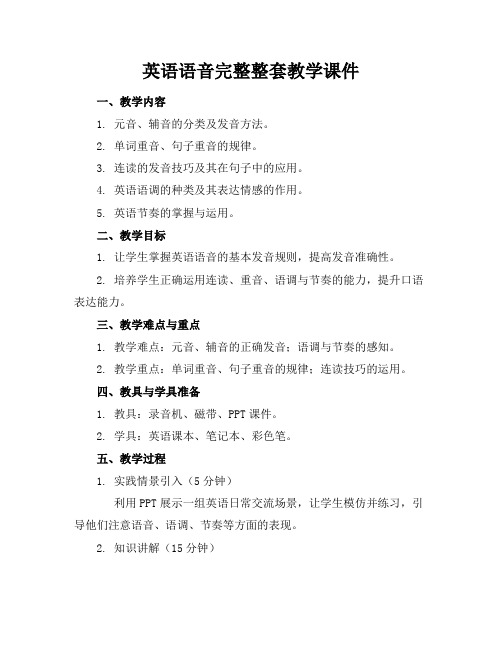
英语语音完整整套教学课件一、教学内容1. 元音、辅音的分类及发音方法。
2. 单词重音、句子重音的规律。
3. 连读的发音技巧及其在句子中的应用。
4. 英语语调的种类及其表达情感的作用。
5. 英语节奏的掌握与运用。
二、教学目标1. 让学生掌握英语语音的基本发音规则,提高发音准确性。
2. 培养学生正确运用连读、重音、语调与节奏的能力,提升口语表达能力。
三、教学难点与重点1. 教学难点:元音、辅音的正确发音;语调与节奏的感知。
2. 教学重点:单词重音、句子重音的规律;连读技巧的运用。
四、教具与学具准备1. 教具:录音机、磁带、PPT课件。
2. 学具:英语课本、笔记本、彩色笔。
五、教学过程1. 实践情景引入(5分钟)利用PPT展示一组英语日常交流场景,让学生模仿并练习,引导他们注意语音、语调、节奏等方面的表现。
2. 知识讲解(15分钟)① 元音、辅音发音规则:通过录音机播放标准发音,让学生跟读并模仿。
② 单词重音、句子重音:结合课本例句,讲解重音规律,进行示范与练习。
③ 连读技巧:以实际例句为例,讲解连读方法,让学生模仿并练习。
④ 语调与节奏:播放英语对话录音,引导学生感知不同语调与节奏的表达效果。
3. 例题讲解(10分钟)选择具有代表性的例题,对语音知识点进行巩固。
4. 随堂练习(10分钟)① 让学生朗读单词、句子,检查发音准确性。
② 模拟实际场景,进行角色扮演,练习语音、语调、节奏。
5. 互动环节(10分钟)六、板书设计1. English Pronunciation2. 内容:① 元音、辅音发音规则② 单词重音、句子重音规律③ 连读技巧④ 语调与节奏感知七、作业设计1. 作业题目:① 复习元音、辅音发音规则,整理笔记。
② 根据所学知识,朗读下列句子,注意重音、连读、语调与节奏:I can't believe it's already five o'clock.The sun is shining brightly outside.They have been working on this project for overa month.③ 自选一段英语对话,进行角色扮演,录音后提交。
英语意群重读弱读连读爆破和语调ppt课件
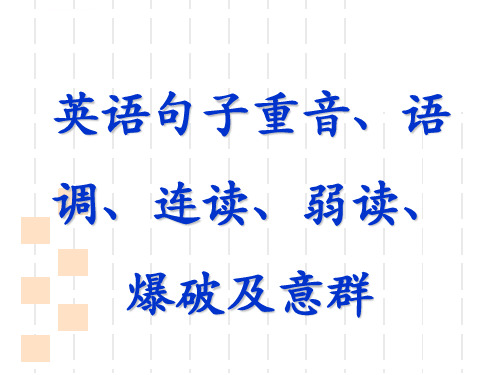
英语句子重音、语 调、连读、弱读、
爆破及意群
从使用情况来看,闭胸式的使用比较 广泛。 敞开式 盾构之 中有挤 压式盾 构、全 部敞开 式盾构 ,但在 近些年 的城市 地下工 程施工 中已很 少使用 ,在此 不再说 明。
▪ Did you tell my ‘wife? ▪ Did you tell ‘my wife? ▪ Did ‘you tell my wife?
▪ We ‘heard ‘John ‘talking. ▪ We ‘heard John talking. ▪ We heard ‘John talking.
▪ 用于置于句首的状语短语或状语从句 ▪ After dinner ↗, I read a magazine and made telephone
calls. ↘ ▪ While you were writing letters ↗, I was reading a book. ↘ ▪ 用于并列句的第一个分句,表示句子还未说完 ▪ My fever is gone ↗, but I still have a cough. ↘ ▪ My major is English ↗, and I like it. ↘ ▪ 用于委婉祈使句 ▪ Excuse me, sir ↗. Can you help me? ↗ ▪ 用于称呼语 ▪ Mrs. Smith ↗, this is Tom Jones. ↘
从使用情况来看,闭胸式的使用比较 广泛。 敞开式 盾构之 中有挤 压式盾 构、全 部敞开 式盾构 ,但在 近些年 的城市 地下工 程施工 中已很 with me?
语音语调课件2 音节 重音和虚词

Common sound errors for Chinese Ss
3.4Listen for the stress patterns: the long
stressed syllables (They have full and clear vowel sounds and the pitch change fall on them).
C
Would you care for anything to drink? / I’ll have some tea, please. / Do you want hot tea or iced tea?/ Iced lemon tea please, then.
D Shall I bring you coffee now? / Not right now, thank you./ Do you care for anything else? Yes. Could you bring me a piece of apple pie?
开行专题
4. Strong Forms and Weak Forms
Unit 10 ”打开无序播放键“右首处: 第 四部分录音: Listen and repeat (6 sections: A,B, C, D, E, F). Unit 10 ”23’45 : Filling in the missing words(see the next slide)
Syllbles & Stress and Functional Words
音节、重音和虚词发音
3. Syllables & Stress 3.1 Listen and count the number of
syllables you hear: new / learning/ listening/ get familiar/the sounds of English/ way/purpose/ familiar/ intonation/ make your ears sharper … (Unit 1 全部录音材料)
英语语音语调之单词的重音PPT课件

2021
5
What are the common rules of stress ?
复合词的重音
1.前后两个词已形成一个新词,读音一般为重轻 ‘blackboard ‘basketball 2.前后两个词意思独立,未被视为一个新词,均重读 ‘United ‘Nation(联合国) 3.重音不同,表达的含义不同 P85
2021
6
How to read stressed syllables correctly?
1.重读音节或重读单词要读的长,重,清楚,高,强 2.重读音节类似汉语拼音第四声 P86
2021
7
2021
4
What are the common rules of stress ?
单词的重音
4. 多音节词,即三个音节以上的词 ①轻重轻轻 American[əˈmɛrɪkən]
②次重轻主重轻两种读法,主重一般在倒数第二个音节, 次重在主重往前再倒数第二个音节 revolution [ˌrɛvəˈluʃən]
Pronunciation and Intonation of English 英语语音语调
Class 2 Stress of words 词的重音
2021
1
Main Content
1.What is stress? 2.What are the common rules of stress? 3.How to read stressed syllables correctly? 4.Oral practice
2021
3
What are the common rules of stress ?
单词的重音
1.单音节词,为重读音节 like[laɪk] red[rɛd]
课件4-语音语调1重读、连读、意群、停顿
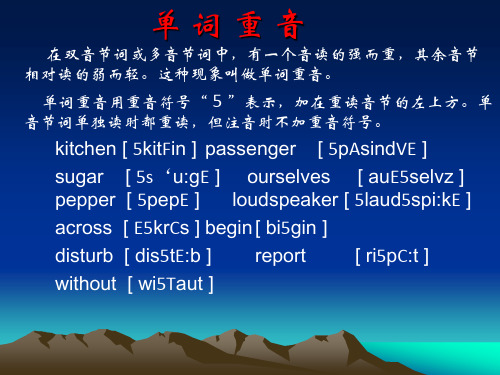
英语的基本语调有二种:
语 调
降调 句子末尾语调下降的叫降调。
陈述句 、祈使句、感叹句、特殊疑问句、 部分反意疑问句均用降调。
升调 句子末尾语调上升的叫升调。
一般疑问句、选择疑问句or前部分、主句
前
的从句、主语前的状语、并列成分and前
部分、表示道歉和请求的句子均用升调。
单词重音
在双音节词或多音节词中,有一个音读的强而重,其余音节 相对读的弱而轻。这种现象叫做单词重音。 单词重音用重音符号“ 5 ”表示,加在重读音节的左上方。 单音节词单独读时都重读,但注音时不加重音符号。
kitchen [ 5kitFin ] passenger [ 5pAsindVE ] sugar [ 5s‘u:gE ] ourselves [ auE5selvz ] pepper [ 5pepE ] loudspeaker [ 5laud5spi:kE ] across [ E5krCs ] begin [ bi5gin ] disturb [ dis5tE:b ] report [ ri5pC:t ] without [ wi5Taut ]
In England, one of the most popular kinds of food / is fish and chips. People usually buy it / in a fish and chip shop. They put it / in a paper bags / and take it home, or to their workplace. Sometimes they eat it / in the park / or on the road.
he suddenly remember / that she had to buy / some DVDs / for her son.
英语语音及重音规则(初学者必备)-PPT

• dim 朦胧的Ødin 喧闹➢ding 唠叨
• seem
Øseen ➢seeing
• sum
Øsun ➢sung
• whim 怪想 Øwin ➢wing
• lead
Øneed ➢read
• light
Ø night ➢right
7
Notes:
1)不应随意加[ә]音的辅音:
[p], [b], [t], [d], [k], [g] [p] top, soap, stop, pop [b] job, cab, robe, pub [t] that, sit, let, best [d] bad, glad, had, mad [k] like, book, kick, cake [g] dog, leg, beg, big
8
大家有疑问的,可以询问和交流
可以互相讨论下,但要小声点
9
2)[θ] [s]不分, [ð] [z]不分
mouth – mouse thief – self thin – sin think – sink this – zoo then – zest them - zone
10
3)[l]音漏读, 误读
在美音中,无论何种情况 r 都发音,发 [r],相当于汉语普通话中的儿化音。
14
car large dark
sir girl first
15
2.元音的差别
[a:] 和[æ ]
在美音中,当 [a:] 出现在[n], [f], [s], [θ]前时发[æ ],在英音中[a:] 发音 不变。
dance, after, fast, path
部分单词在英音和美音中 要重读的音节不同。
英语语音语调详细版.ppt
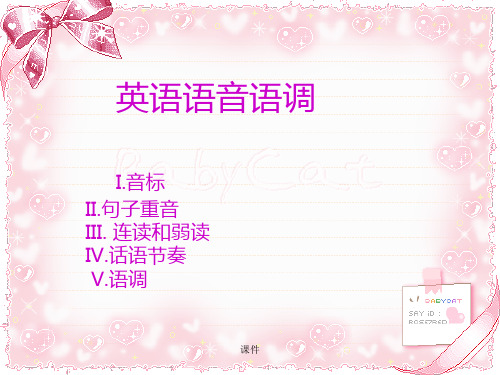
辅音连缀
英语单词中通常有两个或多个辅音连在一起, 这种组合叫做辅音连缀。如:maps/ps/ stop /st/ spade /sp/ grade /gr/ bridge/br/ smile/sm/
在/s/后形成辅音连缀时,/t / /k/ /p/在发音时不送气。
朗读时必须注意: 1.第一个辅音要念得轻些,短些。 2. 不要在这些辅音之间夹入元音。
课件
/f/ 上齿轻轻接触下唇,然后轻轻吹气,使气流从唇
齿间通过,形成摩擦(friction) ,但声带不
振动。 eg: fact(事实),feet(脚),fat(肥的) /v/ /v/和/f/ 发音相似,上齿轻轻接触下唇,然后轻轻
吹气,使气流从唇齿间通过,形成摩擦,但声 带需振动。 eg: give(给),have(有),very(非常)
/ɔ/ 短元音,口腔打开,嘴张大,舌向后缩,双唇稍收
圆。 eg:fond(喜欢的),lock(锁课件),hot(热的)
/s/ 双唇微微张开,舌端靠近齿龈,舌头自然放
松,气流从齿间送出,但声带不振动。 eg: best(最好的),zest(热情),bus(巴士) /z/ /z/口形与/s/ ,双唇微微张开,舌端靠近齿龈,
课件
2、/e/ /æ / / k/ /g/ /f/ /v/
/e/ 短元音,嘴形扁平,舌尖抵下齿,舌前部稍抬起。 eg: egg(鸡蛋),get(到达),send(送) /æ / 短元音,嘴张大,舌尖抵下齿,嘴角尽量拉向两边,
成扁平形。(梅花音,嘴裂最宽一个,腮帮酸胀, 发音就像挤出来一样,感觉不适应。) eg: fat(肥的),bag(包),fact(事实)
突出,声带振动。 eg: bread(面包),red(红色的),rush(冲,奔)
音素重音节奏语调课件

曲调
语调有升有降,常用于表示含 蓄、幽默、讽刺等语气。
语调的运用和作用
表达情感
强调重点
通过语调的变化,可以表达出说话者的喜 怒哀乐等情感。
通过语调的变化,可以强调某些词语或句 子,使听者更加关注重点信息。
区分语义
增强语言表现力
不同的语调可以表达出不同的语义,如“ 你真行”这句话,用升调表示赞扬,用降 调则表示责备。
语调是语音表达的重要手段,它通过 音高、音强、音长和音色等方面的变 化,将语言信息传达给听者,使听者 感知到说话者的意图、情感和态度。
语调的类型
01
02
03
04
升调
语调逐渐升高,常用于表示疑 问、反问、惊讶等语气。
降调
语调逐渐降低,常用于表示陈 述、肯定、感叹等语气。
平调
语调保持平稳,常用于表示平 淡、冷漠、沉着等语气。
重音在语言中起到强调、区分、表达语气等作用。不同的语言和方言有着不同的重音规则,掌握这些 规则有助于提高口语表达和理解能力。同时,在语音学习和教学中,重音也是一个重要的知识点,有 助于纠正发音和提高语音水平。
03 节奏
定义
节奏是指语言中音素、音节、词等要素在一定时间内有规律地交替出现所形成的韵 律特征。
通过运用语调的变化,可以使语言更加生 动、形象、富有表现力,使听者更加深入 地理解说话者的意图和情感。
根据声音的音质:如元音和辅音。
音素的发音
音素的发音是由发音器官的协同 作用产生的。
不同的音素有不同的发音方法和 技巧,需要掌握正确的发音部位
和技巧。
正确的音素发音对于语音的清晰 度和语言的表达能力非常重要。
02 重音
词重音
词重音是指一个词中某个音节被强调的现象。
英语的语音和语调ppt课件
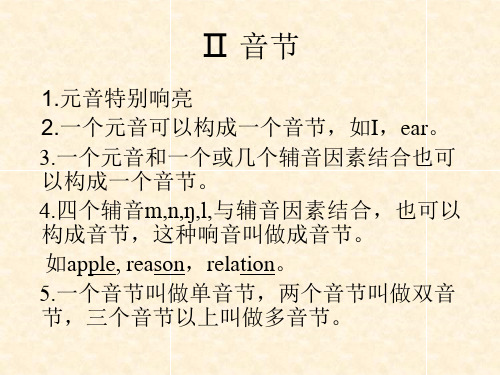
元音字母后面有辅音字母(辅音字母r除外), 还有一个无声的字母e,如face, like, code, cute.
• 在重读开音节中,元音字母a, e, i, o, u 都读它 们字母表的音名。a读作/ei/, e读作/i:/,i读作 /ai/,o读作/əu/ ,u 读作/ju:/ 或/u:/
认识到了贫困户贫困的根本原因,才 能开始 对症下 药,然 后药到 病除。 近年来 国家对 扶贫工 作高度 重视, 已经展 开了“ 精准扶 贫”项 目
Ⅴ 话语节奏Rhythm of English
• 一般语句中,重读和非重读音节相继出现。
• 重读音节相继出现的地方,通常语速会慢一些, 音节听起来也清楚一些。
认识到了贫困户贫困的根本原因,才 能开始 对症下 药,然 后药到 病除。 近年来 国家对 扶贫工 作高度 重视, 已经展 开了“ 精准扶 贫”项 目
认识到了贫困户贫困的根本原因,才 能开始 对症下 药,然 后药到 病除。 近年来 国家对 扶贫工 作高度 重视, 已经展 开了“ 精准扶 贫”项 目
认识到了贫困户贫困的根本原因,才 能开始 对症下 药,然 后药到 病除。 近年来 国家对 扶贫工 作高度 重视, 已经展 开了“ 精准扶 贫”项 目
认识到了贫困户贫困的根本原因,才 能开始 对症下 药,然 后药到 病除。 近年来 国家对 扶贫工 作高度 重视, 已经展 开了“ 精准扶 贫”项 目
认识到了贫困户贫困的根本原因,才 能开始 对症下 药,然 后药到 病除。 近年来 国家对 扶贫工 作高度 重视, 已经展 开了“ 精准扶 贫”项 目
Ⅱ 音节
1.元音特别响亮
2.一个元音可以构成一个音节,如I,ear。
3.一个元音和一个或几个辅音因素结合也可 以构成一个音节。
语音语调课件4+节奏与+语调
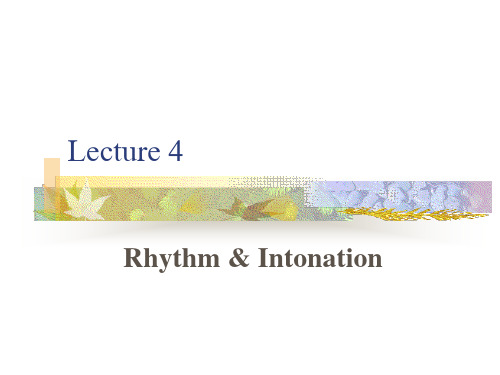
基本语调: 升调
1. 普通疑问句: Have you been to London ↗before?
2. 问候句: Good ↗ morning. Goodbye ↗.
3. 含蓄句: Nobody else could have done
this ↗ better.
4. 表示委婉语气: Take it ↗ easy. I beg your ↗ pardon.
2. Keep the pigs, and the cows and the sheep.
3. Grow some beans, and some dates and some rice.
4. Buy me some maps, and some pens and some books.
5. Buy some more desks, and some chairs and some boards.
语音语调课件4节奏与语调英语语音语调读音规则英语语音语调语音语调美国英语语音语调速成英语语音语调视频实用英语语音语调语音语调练习实用英语语音语调mp3ace语音语调
Lecture 4
Rhythm & Intonation
Rhythm of English Speech
Rhythm pattern in English is based on stress— variation of words or syllables that have strong stress with those that have weaker stress. English speakers
make some parts of words or some words stronger and clearer than the rest.
- 1、下载文档前请自行甄别文档内容的完整性,平台不提供额外的编辑、内容补充、找答案等附加服务。
- 2、"仅部分预览"的文档,不可在线预览部分如存在完整性等问题,可反馈申请退款(可完整预览的文档不适用该条件!)。
- 3、如文档侵犯您的权益,请联系客服反馈,我们会尽快为您处理(人工客服工作时间:9:00-18:30)。
A: I thought you were a student. B: I am a student.
….and that government of the people, by the people, for the people, shall not perish from the earth.
பைடு நூலகம் 一般规则(二):哪些词不重读
在连贯的语句中通常不重读的词有: 1. 冠词、2. 代词(人称、物主、关系代词)、
3. 非实义动词、4.连词、5.介词。
1. 冠词
This is a computer. The computer is my sisters.
2. 代词(人称、物主、关系代词)
5.介词
at, by, for, from, of, in, to, into, etc.
I met him at the airport. He’s from Hong Kong.
注意
和单词重音不同,语句重音并不是一成不变的 语音现象。根据说话时的不同心态、不同的着 重点、不同的强调内容、不同的语气等可以使 原来在句中应重读的词失去重音,而原来不重 读的词却又成了重读的词。
2. 反身代词 myself, yourself, themselves…. He himself hurt his own foot.
3. 不定代词 some, every, all, both, none, other, many, few, somebody, something….
Everybody was late. Some are red; some are blue.
这条规则可以总结为:实词重读
1.名词 noun
An elephant is an animal. I’m a teacher.
2.形容词 adjective
She’s beautiful. Her skirt is blue and white.
3.数词 numeral
I have two brothers. John is nine.
3. 非实义动词
John is studying Chinese. The meeting will be cancelled. He may not go to Shanghai tomorrow. I used to go there.
4.连词
and, or, for, but, as, than, if, when, while, since, now (that), as if, as though, etc.
7.疑问词
1.疑问代词 what, which, who, whom, whose What would you like to eat?
2.疑问副词 when, where, how When did you get there?
8.叹词(interjection)
Oh, it’s snowing. My, what a downpour! Hey, that’s a nice shot! Dear me!
二、停顿、意群、气群
为了使意思表达得更清楚,或者为了换气的需 要,人们在说话或朗读的时候,经常需要停顿 (pausing)。
形式上,标点符号提示停顿,而且提示停顿的 长短。逗号、分号、冒号等停顿较短,句号停 顿较长。
意义上,停顿和意群、气群密切相关。
意群
一个句子可以按照意义和语法结构分为几个部 分,每一个部分可以称为一个意群(sense group)。
① Before 1949/, ↗
②I used to live in Hong Kong/ ↗
③and worked as a teacher. ↘
意义单位 语法单位 语调单位
①1949年 介词短语 升调(句子的一
前
(状语) 部分,意思不完
整)
②我住在 主句(主 升调(句子的一
4.实义动词 notional verb
She sings well. Mary loves her dolls.
5.副词 adverb
He speaks English slowly and carefully.
6.某些代词(指示代词等)pronoun
1. 指示代词 this, that, these, those That boy over there is my cousin.
I am a teacher. They are my friends. My mother often helps me. The book that he is reading is mine. Do you remember the girl whom we met at
the party?
从语义、语法上来讲,意群是能表达某种意思 的一个词,一组词,一个短语或一个分句,一 个从句或一个主句。
从语调上来说,意群是可以用降调、升调或平 调来朗读的一个语调单位。
Before 1949, I used to live in Hong Kong and worked as a teacher.
I won’t do it, for I don’t think it’s right. Will you stay home or stay with me? He works much harder than you. He came to see me but didn’t stay long.
英语语音语调节奏重音
主要内容
一、 语句重音 二、停顿、意群、气群 三、英语中的节奏 四、英语语调
一、语句重音
语句重音指的是人们在朗读连贯的语句时,哪 些词要重读哪些词不要重读的规则。
一般规则
– 重读 – 不重读
注意
一般规则(一):哪些词重读
在连贯的语句中通常需要重读的词有:1.名词、 2.形容词、3.数词、4.实义动词、5.副词、6. 某些代词(指示代词等)、7.疑问词、8.叹词。
